President Bola Tinubu has warned that nullifying the February 25 election that produced him as president, on account of the fact that he did not score 25% of the lawful votes cast during the election in the Federal Capital Territory (FCT) could “lead to absurdity, chaos, anarchy and alteration of the very intention of the legislature.
Besides, Tinubu told the Presidential Election Petition Court (PREPEC) that the two petitions filed by candidates of the Labour Party (LP), Mr. Peter Obi and his counterpart of the People’s Democratic Party (PDP), Alhaji Atiku Abubakar, seeking the nullification of his victory at the February 25, presidential election are not only novel but not familiar with the country’s electoral laws.
Tinubu’s submissions were contained in his final written address against the two petitions pending at the PREPEC.
The five-member panel had on July 5, given the respondents in the two separate petitions 10 days to file their written address, while the petitioners were given seven days to reply.
The panel led by Justice Haruna Tsammani gave the order shortly after, Tinubu, Shettima and the All Progressive Congress (APC) closed their defence in the two petitions as it would be recalled that the Independent National Electoral Commission had closed its case a day earlier.
Both Atiku and Obi, alongside their respective parties, had dragged INEC before the PREPEC for declaring Tinubu and the APC winner of the presidential election.
Amongst the reliefs they seek is the nullification of Tinubu’s election on the grounds that INEC did not substantially comply with the guidelines and regulations for the conduct of the 2023 general elections and relevant electoral laws.
INEC’s Chairman, Professor Mahmood Yakubu, had on March 1, returned Tinubu as the winner of the February 25 elections with 8,794,726 votes while Atiku Abubakar and Peter Obi were said to have scored 6,984,520 votes and 6,101,533 votes, respectively.
Besides faulting the figures which they claimed were incorrect because the collation of results was still ongoing when Mahmood returned Tinubu as the winner, the petitioners also claimed that Tinubu cannot be said to have won the election having not scored 25% of the lawful votes cast in the Federal Capital Territory (FCT).
Besides, the two petitioners argued that Tinubu ought not to be on the ballot because of an alleged United States District Court judgment that ordered his forfeiture of 460,000 US dollars suspected to be proceeds of drug trafficking.
Another reason they are seeking his disqualification regards the alleged double nomination of Shettima, who according to them was already a senatorial candidate for the APC in the Borno Central senatorial district election conducted the same day and time with the presidential poll.
While Atiku before closing his petition called 27 witnesses including INEC’S Presiding Officers and experts, Obi on the other hand called in 13 and tendered a plethora of documents including over 18,000 blurred results sheets on which INEC based its declaration of Tinubu as the winner. Although, INEC, Tinubu, and the APC had interrogated the validity of the witnesses and documents to the petitions and asked the court to discountenance them, however, Tinubu, Shettima, and the APC in the individual written final address have asked the court to dismiss the two petitions because the grounds upon which they are built are not familiar with the country’s electoral laws.
“The petition in issue in this address is very novel in the sense that it is not a petition stricto senso, familiar to our electoral jurisprudence, as the petitioners are not, this time around, complaining about election rigging, ballot box snatching, ballot box stuffing, violence, thuggery, vote buying, voters’ intimidation, disenfranchisement, interference by the military or the police, and such other electoral vices.
“The crux of their grouse this time around is that while the presidential election was peacefully conducted all over the country (as corroborated by their primary witnesses) and the results accurately recorded in the various Form EC8As, some unidentified results were not uploaded electronically to the INEC Election Result Viewing (IREV) Portal.
“The other remote contention of the petitioners is that the 2nd respondent did not score 25% (or one-quarter) of the votes recorded in the Federal Capital Territory, Abuja (FCT); while the petitioners have also alluded to the respondent’s non-qualification, without any fact known to law”, Chief Wole Olanipekun, SAN, counsel to Tinubu had pointed out in the final address dated July 14.
Both Atiku and Obi claimed INEC breached Section 134 of the Constitution when he announced Tinubu who did not score up to 25% of votes cast in the FCT in line with the law.
Section 134(2)(b) of the Constitution provides that:“A candidate for an election to the office of President shall be deemed to have been duly elected where there being more than two candidates for the election- (a) he has the highest number of votes cast at the election; and (b) he has not less than one-quarter of the votes cast at the election each of at least two-thirds of all the States in the Federation and the Federal Capital Territory, Abuja.”
According to the INEC results, Tinubu was only able to garner 19% of votes in the FCT. He, however, argued that it was erroneous for the petitioners to call for the nullification of the entire election based on the FCT results.
“While we have premised this issue on the combined reading of sections 134 and 299 of the Constitution, and section 66 of the Electoral Act, in the course of our arguments … It is apt to submit right from get-go that election is about votes and voters, and when votes and voters are mentioned in any part of the world, there is no superiority of votes or voters as all votes and voters are equal”, adding that there is no superiority between the votes from voters secured in either Lagos or Kano, which are the most populous States and Bayelsa, Ebonyi and Ekiti, which are the least populous States.
Olanipekun further argued that, while Section 3(1) of the Constitution specifically lists the 36 States by their respective names, the sidenote reads thus: “States of the Federation and the Federal Capital Territory, Abuja.”
Section 299, for ease of reference and clarity, provides thus: “The provisions of this Constitution shall apply to the Federal Capital Territory, Abuja as if it were one of the States of the Federation…”
The phrase ‘as if’ has been defined in Corpus Juris Secundum, page 298 as connoting “in the same manner and to the same extent.”
“May we draw the attention of the court to the fact that there is no punctuation (comma) in the entire section 134(2)(b) of the Constitution, particularly, immediately after the ‘States’ and the succeeding ‘and’ connecting the Federal Capital Territory with the States. In essence, the reading of the subsection has to be conjunctive and not disjunctive, as the Constitution clearly makes it so. Pressed further, by this constitutional imperative, the Federal Capital Territory, Abuja, is taken ‘as if’ it is the 37th State, under and by virtue of section 299 of the Constitution.
“With much respect, any other interpretation different from this will lead to absurdity, chaos, anarchy and alteration of the very intention of the legislature.
“Our courts have always adopted the purposeful approach to the interpretation of our Constitution, as exemplified in a host of decisions, including but not limited to Nafiu Rabiu v. State (1980) 12 NSCC 291 at 300-301, Marwa v Nyako (2012) 6 NWLR (Pt. 1296) 199, 306 – 307, ADH Limited v AT Limited (2006) 10 NWLR (Pt. 986) 635, 649, Awolowo v. Shagari (supra), Abraham Adesanya v. President, Federal Republic of Nigeria (1981) 12 NSCC 146 at 167-168; A.G Abia v. A.G Federation (2002) 6 NWLR (Pt. 763) 265 at 365.
“The petitioners themselves admit this much in paragraph 107 of their petition, where they listed the FCT as the 37th State, after listing the States mentioned in section 3(1), as numbers 1 to 36. Again, the maxim, res ipsa loquitur applies to the petitioners.
“Coincidentally, these sections of the Constitution were considered by the Supreme Court in the celebrated case of Buhari v. Obasanjo (2005) 13 NWLR (Pt. 941) 1 at 105 and the apex court held thus:“This provision appears clear to me. Where a candidate wins the highest number of votes cast in at least two-thirds of the 36 States in the Federation and the Federal Capital Territory Abuja, he is deemed to be elected …I do appreciate any ambiguity in the provision and even if there was one, this court is bound to adopt a construction which is just, reasonable and sensible. (See Maxwell on the Interpretation of Statutes, 12th Edition, Chapter 10). In my view, it would lead to absurdity and manifest injustice to nullify the election for the entire nation because of the nullification (sic) of the election of one State, some Local Government Areas, Wards and Units. Such a devastating result could hardly have been contemplated by the framers of the Constitution. It is my conclusion therefore that the cancellation of the election in Ogun State and the other smaller components does not substantially affect the election of the 1st and 2nd respondents. In the event, this petition fails and same is dismissed with costs which I assess at N5,000 in favour of each set of respondents.” The senior lawyer submitted that from the apex court’s judgment above, it could be seen, “That even if results of elections are canceled in more than one State (including the FCT), that election is not rendered invalid, provided, the winning candidate meets the constitutional requirements of one-quarter of the votes cast in two-thirds of the 37 States contemplated. “Anything to the contrary would be devastating, and such was never contemplated by the framers of the Constitution.
“All the winning candidate needs is a majority of the votes, and even if there was no election in one State (including the FCT), or even if the election of a State/States (including the FCT) is/are voided, the entire election cannot be voided or canceled.
“In concluding our arguments on this issue, we urge the court to hold that any election where the electorate exercise their plebiscite, there is neither a ‘royal’ ballot nor ‘royal’ voter; and that residents of the FCT do not have any special voting right over residents of any other State of the federation, in a manner similar to the concepts of preferential shareholding in Company Law. We urge this court to resolve this issue against the petitioners and in favour of the respondent”, he pleaded. Faulting the entire petition, Olanipekun, urged that, “based on the arguments and submissions contained in this address” the Court should “dismiss this petition as totally lacking in merit, substance and bona fide. It has been glaringly shown and demonstrated by the presentation of the petition itself and the evidence presented by the petitioners, including the evidence of PW27, that the petition itself is not only frivolous but also amounts to a crass abuse of the process of the court. Non-existent documents were being sourced and printed from the internet, among others, to be presented before this court, after the filing of the petition, in furtherance of the abusive nature of the petition itself”.
According to him, it was glaringly evident that the election went very peacefully, under a free and fair atmosphere, “without proof in Court of violence, ballot box snatching and such other electoral irregularities and vices; a state of affairs, to which the petitioners’ witnesses all testified.
“In fact, the election was conducted in substantial compliance with the principles of the Electoral Act, the INEC Regulations and Manuals for the election. The unchallenged evidence on record, particularly, the sole witness called by the respondent, is that the 1st petitioner has bided, unsuccessfully, for the office of President of Nigeria severally, even till 2019. On the controversial issue of electronic transmission of results using the Bi-modal Verification Accreditation System (BVAS), Olanipekun said.
“Coincidentally, a host of the witnesses called by the petitioners corroborated the unstable and or unpredictable nature of technological devices/applications within the Nigerian terrain, as this will be demonstrated anon”.
The senior lawyer pointed out that it was wrong for the petitioners to build their case only on electronic transmission as the law also recognizes manual transmission.
“Our clear submission is that all the provisions of the Regulations created the alternative between electronic transmission and transfer, with the use of the article “or”. For instance, paragraph 38(i), which deals with movement from the polling unit states that “on completion of all the Polling Unit voting and results procedures, the Presiding Officer shall: (i) Electronically transmit or transfer the result of the Polling Unit, direct to the collation system as prescribed by the Commission.” Tinubu while faulting the evidence of the 40 witnesses called by both Attiku and Obi, claimed their testimonies rather complimented the case of the respondents.
“The evidence of these witnesses essentially centers round the function of the BVAS and IREV and ultimately seeks to impeach the veracity of INEC’s explanation about the technological glitches that occurred on the day of the election and its implication on the overall results of the election.
“Without equivocation, it is our respectful submission that the petitioners have woefully failed in this adventure of theirs and this will be seen through the direct analysis of their respective evidence. The evidence of PW2 is largely irrelevant for the benefit of the petition, as his witness statement on oath only attempted to outline the various features and functions of the BVAS; the involvement of the Amazon Web Service (AWS) and its corporate profile; as well as the description of the IREV, its workings and configurations.
“However, despite the supposed authoritative assertions of this witness in respect of the BVAS and the IREV, under cross examination, he confessed that he is not familiar with the applications on the BVAS device and that as a software engineer, he has never designed any software that was applied for the conduct of any general election. Though this witness had made several assertions in respect of the AWS in his witness statement, in all fairness to him, he opened up that he is not a staff of AWS.
“Similarly, the witness confessed that he was not aware of the number of software that makes the components that INEC used for the 2023 general election, as he is not an INEC staff, admitting that he never had any of the materials he used for his supposed findings before the court, but on his laptop which was not made available to the court. The irony about this witness is that despite his bogus claim and the bravado exhibited in the statements regarding the various technological issues, he virtually claimed not to be aware of anything at the end of everything”.
On the alleged US forfeiture proceedings, Olanipekun argued that the witnesses of the petitioners failed to point to a single mention of the word “fine” in any of the documents forming part of the proceedings tendered as exhibits, which they admitted had not been registered in Nigeria in line with the clear provisions of section 3 of the Reciprocal Enforcement of Foreign Judgments Ordinance and Foreign Judgment (Reciprocal Enforcement) Act.
“Without prejudice to the foregoing, it is our submission that there is no admissible evidence before this court that will make it void or set aside the election of the 2nd respondent. May we submit straightaway that the petitioners have not produced any evidence before this court to warrant voiding or setting aside the respondent’s election.
“While the petitioners called 27 witnesses, it is our submission that substantially, the cumulative effect of the terse evidence produced by them is against the petitioners. We further draw the attention of the court to the fact that most of the witnesses came to rehash the evidence of others before them. In essence, the end result of their evidence is the alleged non-transmission of already collated and entered results on form EC8A, to IREV portal.
“We adopt our arguments under issue 1, insofar as they relate to the evidence of witnesses and are appropriate for this issue. While we have already raised and argued preliminary objections to the petition itself, it is our further submission that every criminal allegation contained in the petition has not been proved, assuming without conceding that petitioners have not abandoned them. “Starting from PW1, Captain Joe Agada (Rtd.) through to PW27, each of them admitted the correctness of the polling unit results. The law is trite that polling unit results constitute the foundation of an election.
“A successful challenge to the accuracy of a polling unit result is a condition precedent to the challenge of transmission of such result, whether to the ward level, Local Government level, State level or national level, whether manually or electronically. Right from the old case of Nwobodo v. Onoh (1984) 15 NSCC 1 at 23, the Supreme Court has held that election issues end at the polling booths where results are recorded in FEDECO forms (now form EC8A), and that even if any issue arises, those forms and the results therein can be added. In the words of the Supreme Court: “Polling stations are the concrete foundation on which the pyramid of an election process is built.”
“Both the law and statute on this position have not changed, whether with the introduction of BVAS or transmission to IREV. With much respect to the petitioners, one would have expected them to have a rethink on proceeding further with this petition after the delivery of the decision of the Supreme Court in Oyetola v. Adeleke (supra), a decision which covers the field and clinically considers all issues which the petitioners are now agitating before this Honourable Court, including their failure, not only to tender, but identify or attempt to examine through any of their ‘experts’, or witnesses any of the BVAS machines deployed by INEC in the course of the election.
“In the same judgment, the Supreme Court stated that the use of the Voters’ Register has not been discarded under the new dispensation. In this connection, most of the witnesses called by the petitioners and, indeed, all the POS testified to the proper, seamless and effective use of the voters’ registers as well as the BVAS machines”.
Meanwhile, Tinubu has urged the PREPEC to add the sum of 10,929 votes in Kano State, belonging to him but were discounted during the process of collation, stating that if that was done it would increase his votes from 8,794,726 to 8,800,369. “In paragraph 83 of the respondent’s reply, it has been pleaded that the votes scored by him in Kano State was discounted by 10,929; Exhibits RA20 and RA21 were tendered before this court and the sole witness called by the respondents was made to speak to them, identifying the figures relevant to the pleading as appearing in column 9 of each of the exhibits, that is, the votes recorded in RA20(Form EC8D) was discounted by 10,929 in Exhibit RA21 (Form EC8D(A). It was a mere arithmetical error which is apparent in the two exhibits.
“Thus, the court has the power and jurisdiction to add the discounted figure of 10,929 to the final votes of 8,794,726, recorded for the respondent, to make his votes come to a total of 8,800,369, in conformity with Exhibits RA20 and RA21. We urge the court to so hold”, he said.

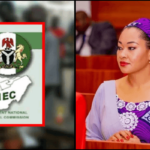
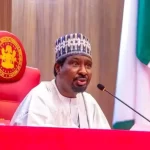
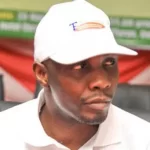


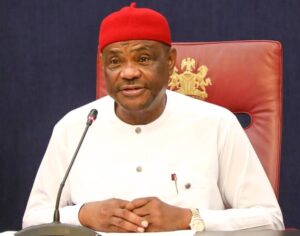
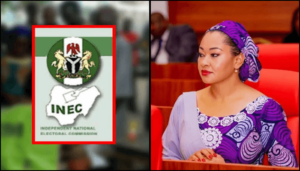
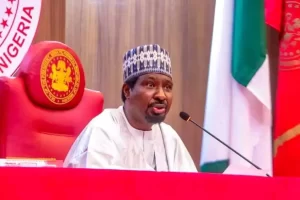
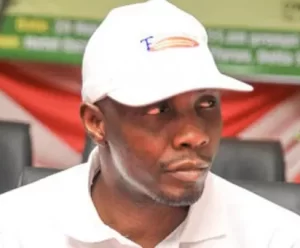
More Stories
Wike to critics: ‘I will live to sign condolence letters of those who said I collapsed’
INEC explains reason for abandoning recall of Senator Natasha
Wanted terrorist Bello Turji reportedly murders 12 persons in Sokoto community hours after elaborate Eid celebration